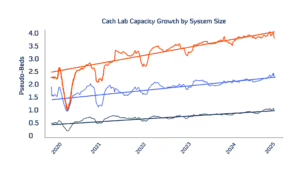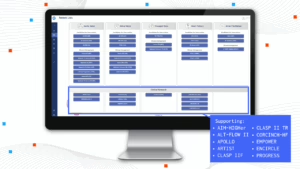Evelio Rodriguez MD, an experienced cardiothoracic surgeon, discusses the use of the CardioCare platform, an AI-driven platform designed by egnite, Inc. to reduce variability and improve patient outcomes…
AIMed AI Champions – Friday, June 18th, 2021
“A large part of my work involves taking care of patients with valvular heart disease,” says Dr. Evelio Rodriguez, a cardiothoracic surgeon based in Nashville, Tennessee. With more than two decades of experience, Dr. Rodriguez provides specialist services at cardiovascular centers affiliated with Ascension, one of the largest faith-based non-profit healthcare systems in the US, managing nearly 150 hospitals.
“We probably read over 55,000 echocardiograms every year in our Nashville market and offering care in a timely fashion becomes an immense challenge,” Dr. Rodriguez notes. “Over time, we observed patients having to wait before getting a formal referral. As specialists, we are always waiting for either the primary care doctors or the general cardiologist to send those patients to us and we knew that some of them were sent too late. That’s something we’ve been paying attention to.”
Noticing the gap in care, Dr. Rodriguez and other cardiovascular specialists at Ascension Saint Thomas adopted CardioCare, an AI-driven quality platform from health-tech company, egnite. “CardioCare allows us to sift through all the echocardiograms that were done in our system and single out individuals who meet the criteria to be referred to a valvular specialist,” Dr. Rodriguez explains. “Overall, we brought the percentage of patients getting diagnosed and referred to specialists to about 96% – way above the 80% national level.
“The platform also helps us with quality control as it monitors established parameters that determine the severity of valvular disease and minimizes variability across practices. Before using CardioCare, some sonographers may have been performing 99% of all required measurements while others were doing 60%. The platform provides information on that, ensuring all sonographers are working at the same level; measuring all the values they need to capture.”
But bringing cutting-edge technology into a large healthcare system is not without hurdles. “The CardioCare platform was introduced at Ascension Saint Thomas in October 2019,” Dr. Rodriguez continues. “Initially, some referring physicians and cardiologists found it a little intrusive as if they were being watched by Big Brother and needed to be told how to manage patients. So, getting their buy-in was the priority.
“Gradually, everyone understood that the platform is trying to assist rather than penalize us because it tells us when we are doing the right thing or not. Our goal is to leverage a platform that enhances what we do. CardioCare readily helps identify valvular disease patients that meet the guideline directed criteria for therapeutic interventions and at the same time ensures that quality is uniform within the healthcare system. When the platform illustrates data where there is opportunity to standardize quality, we take that as a learning opportunity, so that the next time when we see a similar case, we know what to do.”
Dr. Rodriguez believes there’s no solution like the CardioCare platform and is eager to see the platform expand to other cardiovascular diseases in the coming years to provide more comprehensive care for patients.
“My hope is for the portfolio of diseases CardioCare focuses on to expand so to not only identify valvular disease, but also heart failure, atrial fibrillation and stroke.” In addition, Dr. Rodriguez is excited to gain more experience with the platform’s predictive algorithms that captures patients’ echocardiographic data to help physicians predict how patients will progress before the next visit. “This is a game-changer since we are not only able to identify patients within the system that require specialist care, but also predict disease progression timing.
“Physicians don’t get to see their patients often. Some of them are being followed once every six months or once a year. Many things can happen in between visits. Even during a visit, physicians may not have enough time to ask patients all the questions. If algorithms could predict morbidity and risk factors from years of medical history, physicians can spend less time sifting through charts and more time having meaningful conversations with our patients.”
Overall, Dr. Rodriguez encourages physicians to have an open mind to the opportunities AI can bring rather than being afraid of losing control of their patients. “The reality is all decisions are still made by physicians, the platform is just facilitating our decision-making process,” he asserts. “I advise fellow physicians to not be afraid of AI. The technology is not going to hinder our practice but augment it.”
Read the original article here.
CardioCare is a trademark of egnite, Inc. All other trademarks are property of their respective owners.



